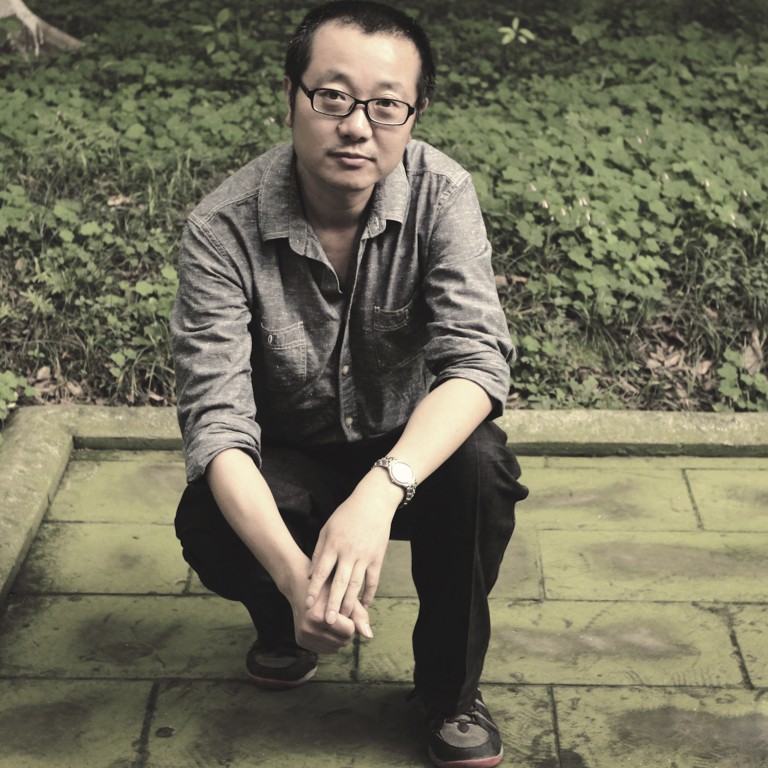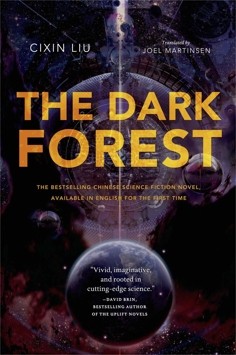
Review | With The Dark Forest, Chinese science fiction writer Liu Cixin shows he can revive genre's conventions
In the second part of his award-winning trilogy, the novelist examines the tension between an individual’s goals and society’s needs
The Dark Forest by Liu Cixin (Tor Books)


This observation from The Dark Forest, the second part of Liu Cixin’s award-winning sci-fi trilogy, catches something real about the genre. Like that other popular genre horror, science fiction has always been mocked and has always indeed been mockable. Predicting what might happen (even if this is a way to criticise what is happening) can make a writer look foolish.
The greatest science fiction overwhelms its audience, captivating with convincingly three-dimensional worlds that touch contemporary nerves. Star Wars is one such, until The Phantom Menace of course. The work of Philip K. Dick is another, bypassing science fiction’s other main drawbacks – pomposity, earnestness and stories too heavy on allegory.
Another way out of the bind is to make a virtue of sci-fi’s potential for silliness and unintentional comedy. There is the famous story about Douglas Adams running into a plot problem in his groundbreaking science fiction comedy The Hitchhiker’s Guide to the Galaxy. Early in book one, his two heroes, Arthur Dent and Ford Prefect, are thrown into cold, vacant space with only 30 seconds to live. How on earth (an obsolete phrase given that the planet had just been blown up) to effect such a near-impossible escape? Adams’ ingenious response was to address the unlikeliness of escape head on, inventing a spaceship powered by an Improbability Drive. Out of this tricky situation, one of his smartest and most enduring plot ideas was born.
The Improbability Drive sprang to mind about a quarter of the way through The Dark Forest. One of Liu’s own lead characters, Dr Luo Ji, an otherwise ordinary scientist, is plucked from obscurity and charged with the small task of saving earth (again) from alien invasion. The clash between humanity and the Trisolarans was told in the first part of Liu’s trilogy, The Three-Body Problem – three is obviously a magic number for Liu.

This deferred apocalypse is a sharp idea – you almost forget the Trisolarans exist for large chunks of the story. Instead, we are confronted by all manner of politicking and chicanery, a strange hum of underlying tension and fundamental questions about each character: for example, how much does each person value posterity compared to their own life?
Liu’s dramatic action is propelled by a different question: how do you solve a three-body problem like a Trisolaran? Humankind’s initial answer is the Wallfacer Project, named after the “ancient Eastern name for meditators”. Solutions to the long-awaited invasion will be pondered by four specially selected candidates in the privacy of their own minds. Because the Trisolarans can read intentions, the Wallfacers’ individual plans should mask other, more arcane strategies: “the thoughts and behaviours these Wallfacers present to the outside world will be entirely false, a carefully crafted melange of disguise, misdirection, and deception.”
Liu’s second novel is, then, not driven by improbability, but by bluff and counter bluff, which quite possibly extends to triple and quadruple bluffs. The resulting narrative is at once deadly serious and constantly on the verge of baffling silliness. Luo is the most obvious example. While his three more celebrated Wallfacer peers develop admittedly slippery plans involving space fleets, nuclear weapons and neuroscience, Luo realises that doing what is expected is not what is expected.

The question of whether Luo is playing a long game, or is merely an opportunist fulfilling his own desires while he can, has broader thematic and historical resonances. As one character says of the delayed Trisolaran attack: “We have four hundred years. In the past, human society used exactly that amount of time to evolve from the era of collective heroism to one of individualism, so why can’t we use the same amount of time to evolve back?”
Such friction between the self and the greater good, between short and long-term interests, could be read as representing everything from global apathy about the environment to a commentary on China’s recent past. These political subtexts were quite overt in The Three-Body Problem, which began in the Cultural Revolution. It is hard not to read the Trisolarans’ ability to inspect the workings of the human mind as an allegory for a totalitarian government’s desperate control of its citizens.
The Dark Forest broadens Liu’s political scope. The dilemma faced by almost all the central characters – broadly between duty and personal fulfilment – might describe China’s efforts to balance the restraints of communism with the freedoms of capitalism. Such tensions inform Liu’s other protagonist, the soldier Zhang Behai, who plays a similar game to Luo, but from almost the opposite end of the spectrum. His devotion to optimism in the face of the Trisolaran threat – as opposed to the twin foes of defeatism and escapism – suggests that he only hears the call of duty. But hints of cross purposes are carried by his haunting by his dead father.
Liu speaks a great deal of sense about where humankind is now and where we might be going
Zhang embodies another of his creator’s thematic concerns, namely: “The source of this defeatism stems primarily from the worship of technology, and the underestimation or complete dismissal of the role of human initiative and the human spirit in war.” There is a certain irony in this belief, given Liu’s own hi-tech musings: “to define a large number of index parameters in every major scientific discipline, but the core parameter will be the speed and range of a ten-kiloton-class spaceship.”
If The Three-Body Problem suffered a little from this sort of detail, then The Dark Forest is a distinct storytelling advance. Granted, there is still much scientific explication, and not a small amount of abstract theorising: “A realm where both self and other are forgotten, an effort to encompass everything by shutting out everything.”
Yet Liu immediately offers a nice counterpunch: “That’s too much philosophy for me to understand” is the next lighthearted line.
More importantly, this skeletal intellectualising is fleshed out in part through strong characters who constantly surprise and a plot that twists like a Trisolaran droplet ship (you’ll have to read the novel to understand that).
The result is that Liu emerges as a writer who can excite with vivid set pieces and one able to refresh genre conventions. Even more impressively, he speaks a great deal of sense about where humankind is now and where we might be going. The answer to the latter part is not especially hopeful, but the Trisolaran war - like Liu’s trilogy - is not over yet.

